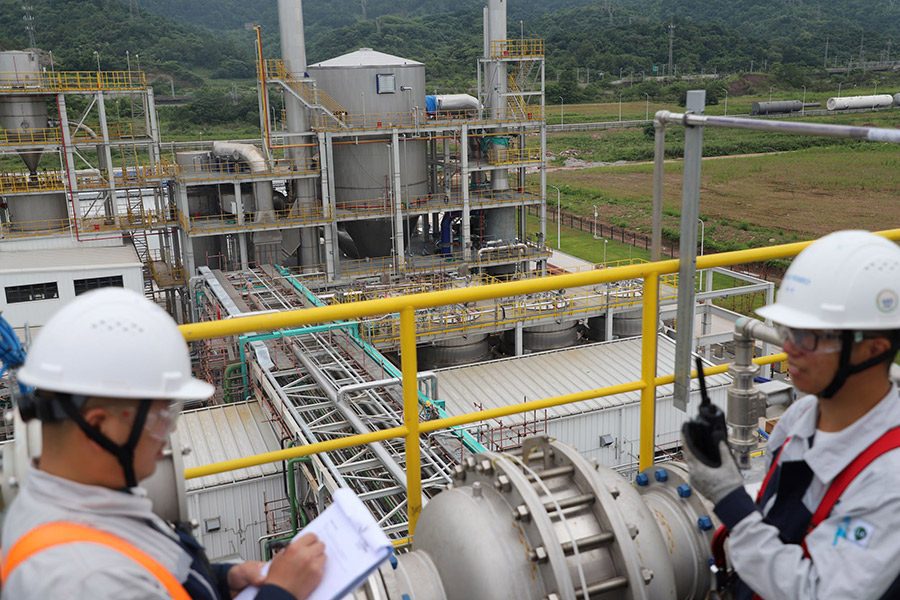Calysseo, a joint venture between Calysta, a leader in alternative protein production, and Adisseo, a prominent player in animal nutrition, has announced plans to construct a state-of-the-art alternative protein facility in Al Jubail, Saudi Arabia. This initiative is being developed in partnership with Food Caravan, marking a significant step towards enhancing protein production in the region.
Table of Contents
Project Overview
The partners are engaged in advanced discussions and detailed planning to establish a facility capable of producing 100,000 tonnes of protein annually, utilizing Calysta’s innovative fermentation technology. This facility will exclusively utilize no animal or plant ingredients, significantly reducing resource requirements. If all approvals and construction timelines align, the plant could commence operations by the end of 2026.
This announcement follows the successful activation of Calysseo’s first fermenter in China, which has a capacity of 20,000 tonnes and is dedicated to producing FeedKind® Aqua protein for aquaculture. The upcoming facility in Saudi Arabia will be five times larger, underscoring the ambitious scale of the project.
Addressing Global Protein Demand
Alan Shaw, CEO, President, and co-founder of Calysta, highlighted the critical need for sustainable protein sources to feed the anticipated global population of 10 billion by 2050. He stated, “Our mission is to provide more sustainable protein and to produce it in regions where it is currently unfeasible.” The facility in Saudi Arabia represents a significant milestone in achieving this goal, further supporting the global demand for sustainable protein.
The patented fermentation process employed by Calysta relies on naturally occurring bacteria, enabling rapid scaling of production while minimizing the use of water and arable land. The resulting protein is non-GMO, highly nutritious, and rich in essential amino acids and vitamins.
Commitment to Sustainability
Jean-Marc Dublanc, CEO of Adisseo, emphasized the importance of this venture in fostering sustainable protein production. He noted, “This announcement is a significant milestone as we progress towards more sustainable protein production methods. Our partnership with Calysta is crucial in addressing the evolving needs of the feed ingredient market.”
The project has received support from the Saudi Ministry of Energy, which has allocated gas for the facility, and the Royal Commission for Jubail and Yanbu has designated a site for construction. Furthermore, backing from the Ministry of Investment of Saudi Arabia and the National Industrial Development Centre illustrates the government’s commitment to this initiative.
Proven Efficacy and Applications
Calysta’s protein ingredients have undergone validation in numerous independent trials, demonstrating their effectiveness as nutritious feed alternatives in aquaculture. Recent studies, such as those conducted by Thailand’s Kasetsart University, have shown that FeedKind® enhances shrimp health and growth while activating immune responses to common pathogens, addressing critical challenges in aquaculture.
Calysta’s protein platform is also approved for use in livestock feeds and pet food globally, reinforcing its role as a sustainable feed ingredient that aids in biodiversity preservation.
Vision for the Future
Dennis Leong, Co-Managing Director of Calysseo, remarked on the transformational potential of Saudi Arabia as a protein producer, calling it a “paradigm shift for the world.” He expressed enthusiasm for the rapid advancement of plans for the new facility, highlighting the significance of this milestone for food and feed security.
Research from the World Resources Institute indicates that global food production must increase by 56% to meet future demand, while reports from Chatham House and UNEP identify food systems as a major driver of biodiversity loss. This facility aligns with the pressing need for innovative solutions in food production.
Saleh Al-Shabnan, CEO of Food Caravan, noted that this project supports Saudi Arabia’s Vision 2030, contributing to food security, emissions reduction, job creation for Saudi nationals, and the introduction of advanced technology into the Kingdom. He described the initiative as a disruptive force in the global food supply chain.
For more details, visit Calysta and FeedKind.




